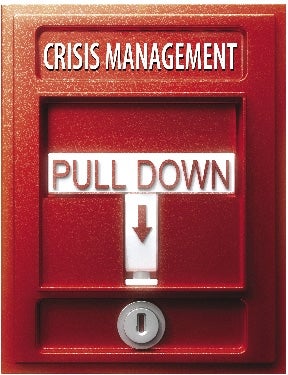It’s the last thing you want to deal with, but you can’t ignore it. When bad news strikes and reaches a crisis level, companies need to communicate promptly and thoughtfully to address, rather than inflame, the crisis.
Once it erupts, there’s virtually no time to spare. Reporters will call. Tweets will fly. If it’s really bad news, television trucks may roll up to the building. When this happens, the nature of the crisis must shape communications. A threat to people’s safety from a defective product or a hazardous chemical leak from your plant demands a different response than a revelation of bad behavior by the CEO. Specifics of the communications strategy will vary widely, but these five general rules apply.
1) Hiding is never a good idea.
If you don’t communicate, then the story will be defined by others who don’t have your best interests in mind. When people read that the subject of the crisis couldn’t be reached for comment, or see the CEO caught on video running from reporters, they assume the worst. Even if there are significant legal considerations of liability, there is still room to communicate effectively.
2) Don’t speculate or release
questionable information.
It’s important to communicate quickly, but there are huge risks to providing bad information. Credibility is a vital corporate and personal asset that, once lost, is hard to regain. If you end up changing your story, or are exposed for providing false information, then there is long-lasting damage to your reputation.
3) To avoid the credibility trap, use brief, general statements early in the crisis and don’t be afraid to say “we don’t know.”
Early statements can be made in person or in writing and should acknowledge the situation, offer concern for any victims, indicate that you’re working to address the matter and pledge cooperation with authorities involved. In a crisis of wrongful accusation, such as responding to a lawsuit, an initial statement may also include a firm assertion of innocence if warranted.
4) Designate a credible spokesperson and communicate regularly.
Usually, for small and mid-sized companies, the owner or CEO is the best choice. People expect the buck to stop with the boss, and will want to hear what he or she has to say. Whenever possible, the spokesperson should practice questions and answers with staff before speaking with the media. Repetition helps people stay on message. Companies should also use their own communications channels, — website, social media, etc. — to deliver information directly to the public.
5) Finally, if contrition is called for, then apologize — but do it right.
A half-hearted or improperly worded apology can make matters worse. To understand the difference, there is no better resource than “On Apology” by Dr. Aaron Lazare, chancellor emeritus of University of Massachusetts Medical School. In this easy-to-read book, Dr. Lazare exposes the flaws of bad apologies, explains the elements of a real apology and documents the healing effect they can have.
________________
Michael Cohen is co-founder of Cohen Partners, based in Boston and Worcester, which provides government relations, strategic communications, and business development services. He can be reached at mic@cohenpartners.net.

